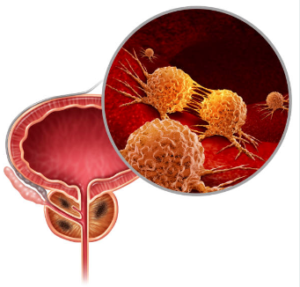Unlocking Vitality: Men Over 40 with Benign Prostatic Hyperplasia
 Unlocking Vitality: Men Over 40 with Benign Prostatic Hyperplasia
Unlocking Vitality: Men Over 40 with Benign Prostatic Hyperplasia
Empower Your Prostate Health Journey with Natural Solutions
As men age, the prostate gland can become a source of concern. Whether you’re navigating the early signs of benign prostatic hyperplasia (BPH) or seeking ways to maintain optimal prostate function, this article is your compass. We’ll delve into evidence-based strategies, explore natural remedies, and empower you to take charge of your well-being.
The Prostate Puzzle: Understanding BPH and Beyond
Decoding Benign Prostatic Hyperplasia (BPH)
BPH, commonly known as an enlarged prostate, affects countless men worldwide. It’s like a traffic jam in your urinary system—slowing down the flow and causing discomfort. But fear not! We’ll explore effective ways to ease the congestion.
Milk Thistle: Nature’s Guardian for Prostate Health
 Harnessing the Power of Milk Thistle
Harnessing the Power of Milk Thistle
Milk thistle isn’t just for cows—it’s a potent ally for your prostate. Rich in antioxidants, this herbal marvel shields your prostate cells from oxidative stress. Imagine it as a knight defending your castle walls against invaders.
Milk Thistle: The Protective Knight
- Silymarin: The Active Compound: Most prostate-related benefits of milk thistle come from silymarin, a complex of antioxidant flavonoids. Silymarin reduces inflammation and helps neutralize harmful free radicals.
- Oxidative Stress: The Hidden Enemy: Oxidation is a normal bodily process, but excessive amounts can damage cells. Prostates are susceptible to oxidative stress, which may contribute to BPH and even prostate cancer risk.
- Armor against Cellular Damage: Milk thistle acts as a shield, protecting prostate cells from oxidative damage that can contribute to overgrowth (BPH) or the development of abnormal cells (prostate cancer).
Potential Benefits for Prostate Health
While more research is needed for definitive conclusions, studies suggest milk thistle might:
- Reduce BPH symptoms: Some research shows that milk thistle supplements may improve urinary flow and reduce nighttime urination in men with BPH.
- Combat Inflammation: Chronic inflammation in the prostate is linked to both BPH and prostate cancer. Milk thistle’s anti-inflammatory action could be protective.
- Potential Anticancer Support: Lab and animal studies hint that silymarin might slow the growth of prostate cancer cells. However, it’s crucial to note that this does not replace conventional cancer treatments.
Important Considerations using milk thistle
- Safety: Milk thistle is generally considered safe for most people, but it can interact with certain medications. Always check with your doctor before starting any new supplement.
- Not a Standalone Treatment: While promising, don’t view milk thistle as a replacement for medical advice or prescribed BPH or prostate cancer treatments. Think of it as a potential bonus layer of protection.
- Research is Ongoing: More studies are needed to fully understand the extent of milk thistle’s benefits for the prostate and determine the most effective dosages.
Harnessing the Power of Milk Thistle
If interested in incorporating milk thistle, consider the following:
- Talk to your doctor: Especially important if you are taking any medications or have underlying health conditions.
- Choose a quality supplement: Look for products standardized to contain a specific percentage of silymarin.
- Be Patient: Don’t expect overnight miracles. The effects of milk thistle may take time to become noticeable.
Remember, while milk thistle shows promise, it’s one piece of a larger prostate health puzzle. A healthy diet, regular exercise, and maintaining a healthy weight also play crucial roles!
Whey Protein: Fueling Your Prostate Resilience
Protein Power for Prostate Warriors
Whey protein isn’t just for gym buffs. It’s a secret weapon against prostate woes. Packed with amino acids, it supports muscle strength and overall vitality. Think of it as your
trusty sidekick on this health journey.
Let’s dig into why whey protein might be a valuable addition to your prostate health arsenal:
The Potential Benefits of Whey Protein for Prostate Health
-
Glutathione Boost: Whey protein is a rich source of cysteine, an amino acid crucial for the production of glutathione. Glutathione is a master antioxidant that helps protect cells from oxidative stress, which is linked to prostate problems like BPH and potentially even prostate cancer.
-
Muscle Maintenance: As we age, we naturally lose muscle mass, a process called sarcopenia. Whey protein helps maintain and rebuild muscle tissue. Stronger muscles can support pelvic floor health, which is important for urinary control. Also, better overall fitness supports general health and well-being.
-
Healthy Weight Management: Whey protein can be a valuable tool in achieving or maintaining a healthy weight. Since being overweight or obese increases the risk of prostate issues, whey protein can be an indirect supporter.
-
Immunity Support: While not directly targeting the prostate, having a well-functioning immune system is crucial for overall health and may even play a role in preventing prostate issues from developing or worsening over time.
Important Considerations
- Quality matters: Choose high-quality whey protein sources. Opt for brands with minimal added sugars and artificial ingredients.
- Not a cure-all: Think of whey protein as a tool, not a magical solution. It works best alongside a healthy diet, exercise, and other prostate-smart lifestyle choices
- Talk to your doctor: It’s especially important to consult your doctor if you have any kidney issues, as too much protein may put a strain on them. They’ll advise you about the ideal amount of protein for you.
How to Incorporate Whey Protein
- Smoothies & Shakes: A quick and easy way to get your whey protein boost. Blend it with fruits, leafy greens, and a little nut butter for a satisfying, nutrient-packed snack.
- Supplemental Options: Consider protein powders or bars if you struggle to get enough through food alone. Look for products specifically aimed at older adults, as they often have less sugar and more tailored nutrient profiles.
Remember, while research hints at potential benefits, it’s still an evolving area. Consider whey protein as one piece of your overall prostate health strategy
Navigating BPH Medications: A Prudent Approach
BPH Medications: Friend or Foe?
Conventional medications play a role in managing BPH symptoms. We’ll explore their pros and cons, helping you make informed choices. Remember, knowledge is power!
BPH Medications: The Helping Hand
- Symptom Relief: Medications are often the first line of defense against bothersome BPH symptoms. They can provide significant relief from issues like urinary urgency, a weak stream, and difficulty emptying your bladder.
- Improved Quality of Life: By reducing the disruptive symptoms of BPH, medications can help you regain control over your daily life, sleep patterns, and overall comfort.
- Potentially Prevent Complications: In some cases, medications can help lower the risk of complications associated with BPH, such as urinary tract infections or the need for more invasive interventions.
BPH Medications: The Potential Foe
- Side Effects: Like all medications, BPH treatments can have drawbacks. Common side effects include dizziness, lightheadedness, fatigue, headaches, and sexual side effects (like decreased libido or retrograde ejaculation).
- Not Addressing the Root Cause: Most BPH medications work by tackling the symptoms rather than shrinking the prostate itself. This may mean you need to use them long-term to manage symptoms.
- Medication Interactions: Some BPH medications can interact with other drugs you might be taking. It’s crucial to inform your doctor about all medications and supplements you use.
- Cost: BPH medications can be expensive, and insurance coverage may vary.
The Decision-Making Power is Yours
Here’s how to approach BPH medications wisely:
- Open Dialogue with Your Doctor: Discuss your symptoms, concerns, and medical history openly. Your doctor can tailor a treatment plan based on your specific needs and potential risks, guiding you through the different drug options.
- Understanding the Trade-off: Weigh the potential symptom relief against the possible side effects. Is the improvement in your quality of life worth the risk of certain side effects? It’s a personal decision.
- Monitoring and Adjustment: Pay attention to how your body responds to treatment. Communicate with your doctor about any side effects or if you’re not seeing improvement, as dosage adjustments or trying a different medication might be needed.
Beyond Pharma: It’s Not an Either/Or Situation
Medications aren’t the only solution for BPH. Consider them alongside:
- Lifestyle Changes: Reducing caffeine and alcohol intake, managing bladder habits, and pelvic floor exercises can be very beneficial.
- Minimally Invasive Procedures: Various options exist that can directly address prostate enlargement if medications aren’t providing sufficient relief.
- Complementary Therapies: While more research is needed, some natural supplements like saw palmetto or beta-sitosterol might offer symptom support.
Remember, finding the right BPH management plan, whether it involves medications or not, is a journey of informed decisions and collaborating with your doctor. Let me know if you’d like to delve into the specifics of different BPH treatment options!
Beyond BPH: When Prostate Meets Cancer
 BPH and Prostate Cancer: A Delicate Balance
BPH and Prostate Cancer: A Delicate Balance
Navigating the intersection of BPH and prostate cancer requires finesse. We’ll unravel the complexities, offering insights to safeguard your prostate health.
BPH (Benign Prostatic Hyperplasia)
- What it is: Non-cancerous enlargement of the prostate gland, extremely common in older men.
- Symptoms: Frequent urination, difficulty starting or stopping urination, weak urine stream, feeling like the bladder isn’t fully emptied.
- Relationship to Cancer: BPH itself doesn’t increase prostate cancer risk, but they can co-exist. Similar symptoms can make it tricky to differentiate between the two.
Prostate Cancer
- What it is: Malignant growth of cells within the prostate gland.
- Symptoms: Early stages may show no symptoms. Later symptoms can overlap with BPH: urinary issues, blood in urine or semen, erectile dysfunction, pain in the hips or lower back.
- Relationship to BPH: Having BPH doesn’t directly cause prostate cancer. However, an enlarged prostate can make detecting cancer through standard screening tests more challenging.
The Delicate Balance between BPH and Prostate Cancer
- Shared Symptoms: The overlap in symptoms complicates diagnosis, especially as both conditions are more common with age.
- Detection Challenges: An enlarged prostate caused by BPH can mask signs of prostate cancer during a digital rectal exam (DRE) or make interpreting PSA (prostate-specific antigen) blood test results more difficult.
Navigating the Path to Prostate Health
- Regular Checkups: Especially crucial for men over 50 (or earlier if you have risk factors like family history or African ancestry).
- Open Communication: Discuss all urinary symptoms with your doctor, even if you assume they’re just BPH.
- Screening: PSA tests and DREs remain important tools, along with potentially more advanced imaging if there’s suspicion. Your doctor will tailor a screening plan based on your individual circumstances.
- Management of BPH: Medications or procedures to relieve BPH symptoms can also improve the ability to detect potential prostate cancer.
Key Points
- BPH and prostate cancer are distinct conditions.
- They can occur in the same person, making diagnosis and management more complex.
- Proactive communication with your doctor and regular screenings are essential for safeguarding your prostate health.
Alpha 1 Blockers: Your Allies in the Battle Against BPH
Alpha 1 Blockers: Clearing the Pathway
These medications are like traffic controllers for your prostate. They ease the flow, allowing you to reclaim your comfort. Let’s explore their impact and potential sidekicks.
Alpha-1 Blockers: The Traffic Controllers
- The Target: Alpha-1 blockers specifically target alpha-1 adrenergic receptors. These receptors are found in smooth muscle tissues throughout the body, including the prostate and bladder neck.
- Relaxing the Muscles: By blocking these receptors, alpha-1 blockers cause the smooth muscles in the prostate and bladder neck to relax.
- Clearing the Pathway: This relaxation widens the urinary passage within the prostate, reducing constriction and improving urine flow. Think of it like opening extra lanes on a congested highway.
Benefits for BPH
- Reduced Symptoms: Alpha-1 blockers effectively reduce bothersome BPH symptoms like urgency, weak stream, and difficulty starting or stopping urination.
- Rapid Relief: They often provide noticeable improvements within days or weeks of starting treatment.
- Improved Quality of Life: By relieving urinary symptoms, these medications can significantly enhance your overall comfort and well-being.
Potential Sidekicks
Sometimes, alpha-1 blockers are combined with other medications for optimal BPH management:
- 5-alpha-reductase inhibitors (5-ARIs): These medications, such as finasteride and dutasteride, work by shrinking the prostate gland over time. The combination can provide longer-term, more comprehensive relief.
- Phosphodiesterase-5 inhibitors (PDE-5 inhibitors): Originally developed for erectile dysfunction, drugs like tadalafil can sometimes help with urinary symptoms and improve sexual function as well.
Important Considerations
- Side effects: Alpha-1 blockers can sometimes cause dizziness, lightheadedness (especially when standing up quickly), fatigue, or headaches.
- Blood pressure: As these medications relax blood vessels, they can lower blood pressure. Monitoring your blood pressure is important, especially if you already have low blood pressure.
Always remember to discuss the best medication plan for your individual needs and medical history with your doctor.
BPH: More Than an Acronym
BPH Unveiled: What Your Doctor Might Not Tell You
Understanding BPH goes beyond medical jargon. We’ll demystify it, empowering you with actionable knowledge. After all, an informed warrior is a formidable one.
Things Your Doctor Might Not Highlight
-
It’s REALLY common: Sometimes, doctors make prostate enlargement sound less inevitable than it is. Most men will experience some degree of BPH as they age. It’s as normal as getting wrinkles! Knowing this can destigmatize the condition and make it easier to talk about.
-
The Emotional Toll: Urinary problems go beyond physical discomfort. BPH can cause anxiety about finding a bathroom, interrupt sleep, and strain relationships. Acknowledging this empowers you to seek help managing both physical and mental impacts.
-
Impact on Sex Life: BPH itself doesn’t typically cause erectile dysfunction, but common BPH medications can. Also, urinary symptoms can dampen your enthusiasm. It’s important for you and your partner to have open discussions with your doctor about these concerns
-
Lifestyle Changes Matter: Doctors often focus on medication and procedures. While those are important, changes like avoiding bladder irritants (caffeine, alcohol), managing fluid intake, and pelvic floor exercises can make a real difference alongside medical treatment.
-
It Doesn’t Automatically Mean Surgery: The word “enlarged” can be scary. Most men with BPH manage it without surgery for a very long time. It’s about finding the right combination of lifestyle modifications, medications, and less invasive procedures if needed.
How to be Your Own Best Advocate
-
Don’t be Shy: Urination and sex might be embarrassing topics, but it’s your body! Be honest with your doctor about all the ways BPH affects you.
-
Take Notes: Keep a log of your symptoms, including their severity and how they affect your day-to-day life. This helps track your condition and have more targeted conversations with your doctor.
-
Ask Questions: “What is causing my symptoms?”, “What are all my treatment options?”, “How might this impact my life down the road?” Don’t settle for vague answers.
-
Seek a Second Opinion: If you feel dismissed or like your treatment plan isn’t working, don’t be afraid to consult another urologist.
You are not alone in this battle! With the right understanding and proactive communication with your healthcare team, you can absolutely manage BPH and live a full, active life.
Flomax: Friend or Foe?
Flomax: The Tug-of-War
Flomax—a familiar name in BPH treatment. But is it your ally or adversary? We’ll dissect its role, so you can make an educated decision.
Flomax: The Ally
- Fast Action: Flomax is known for providing relatively quick relief from BPH symptoms. Some men notice improvements within days or a couple of weeks.
- Effective Symptom Control: For many men, Flomax significantly improves urinary flow, reduces urgency, and lessens the feeling of incomplete bladder emptying.
- Generally Well-Tolerated: While side effects can occur, most men find them manageable compared to the relief Flomax provides.
Flomax: The Potential Adversary
- “Orthostatic Hypotension”: This is a fancy term for dizziness or lightheadedness upon standing up, especially in the initial stages of treatment. Taking Flomax at night and being careful when changing positions can help with this.
- Potential Side Effects: Other side effects may include headaches, fatigue, runny nose, and sexual side effects like retrograde ejaculation (semen going into the bladder instead of out during orgasm).
- Not For Everyone: Flomax may not be ideal for men with very low blood pressure. There are also some drug interactions to consider your doctor will need to assess.
- Symptom Relief, Not a Cure: Flomax primarily tackles the symptoms of BPH; it doesn’t address the underlying prostate enlargement. This me means you may need ongoing treatment to maintain symptom improvement.
The Verdict: A Tool, Not a Miracle
Flomax can be a powerful weapon against bothersome BPH symptoms. However, it’s important to go into treatment with realistic expectations and understand potential drawbacks. Here’s how to decide:
- Talk to your doctor: Openly discuss your medical history, BPH symptoms, and any concerns you may have. Your doctor can help you weigh the potential benefits against risks in your specific case.
- Trial Period: Starting Flomax often involves some dose adjustments and a bit of patience to see how it works for you.
- Monitor Side Effects: Pay attention to how your body responds to the medication. Report any bothersome or persistent side effects to your doctor.
Remember, Flomax is just one tool in the BPH treatment toolbox. Other alpha-blockers and different medication classes might be explored. It’s about finding the best fit for your individual needs!
Navigating the Medication Maze
BPH Meds to Embrace and Avoid
Not all medications are created equal. We’ll guide you through the labyrinth, highlighting which ones to embrace and which to sidestep. Your prostate deserves the best.
The Art of Avoidance: Medications and Enlarged Prostate
Steering Clear of Trouble
Certain medications can stir the BPH pot. We’ll reveal the culprits, ensuring you navigate the pharmaceutical landscape with wisdom.
Here’s a guide to medications that can potentially worsen BPH symptoms and those you might want to discuss with your doctor:
Potential BPH Agitators
-
Decongestants: Common cold and allergy medicines containing pseudoephedrine or phenylephrine work by constricting blood vessels. This constriction can also tighten the muscles around your bladder neck and prostate, making urination more difficult.
-
Antihistamines: Older generations of antihistamines, like diphenhydramine (Benadryl) and chlorpheniramine, have anticholinergic effects. These effects can interfere with bladder muscle contractions, making it harder to empty your bladder fully.
-
Antidepressants: Some older antidepressants known as tricyclics (amitriptyline, imipramine, etc.) can also worsen BPH symptoms due to their anticholinergic effects. While newer antidepressants generally pose less risk, it’s still a good idea to discuss them with your doctor.
-
Diuretics: Often used for high blood pressure, diuretics increase urine production. While important for their intended use, they can put extra strain on a urinary system already struggling due to BPH.
-
Certain Parkinson’s and Overactive Bladder Medications: Some medications in these categories work on the same pathways impacted by BPH, potentially worsening symptoms.
The Art of Awareness: What to Do
- Don’t Self-Medicate: Avoid taking over-the-counter medications for colds or allergies without consulting your doctor or pharmacist first.
- Open Communication: Always tell your doctor about your BPH diagnosis when discussing any new medications (prescribed or over-the-counter).
- Review with Your Doctor: It’s wise to periodically review all your current medications with your doctor to ensure they’re not exacerbating prostate issues.
- Explore Alternatives: If a medication is likely to worsen your BPH symptoms, ask your doctor about potential substitutes or alternative therapies for the condition you’re treating.
Important Notes:
- Don’t Stop Medications Abruptly: Never stop taking prescribed medications without consulting your doctor. There might be safe ways to switch medications or manage any side effects.
- Individual Response Varies: Not everyone experiences worsened BPH with these medications. Your sensitivity depends on several factors, including symptom severity and specific medications.
Knowledge is your best defense! By being aware of potential medication interactions, you empower yourself to work with your healthcare team to optimize your BPH management and overall well-being.
Unlocking the Prostate’s Secrets
Beyond Medications: Holistic Approaches
From nutrition to mindfulness, we’ll explore holistic strategies. Think of it as a treasure map leading to your prostate’s well-being X.
Diet: Fueling Prostate Wellness
- Anti-inflammatory Powerhouses: Focus on fruits, vegetables, and whole grains bursting with antioxidants and anti-inflammatory compounds. Think vibrant berries, leafy greens, tomatoes (rich in lycopene), and cruciferous veggies (broccoli, cauliflower).
- Omega-3 Treasures: Fatty fish (salmon, tuna), flaxseeds, and walnuts deliver omega-3 fatty acids, which research suggests might help in reducing inflammation.
- Zinc Boost: Pumpkin seeds, oysters, and chickpeas are good sources of zinc, which is important for prostate function.
- Minimize the Troublemakers: Limit processed foods, red meat, excess saturated and trans fats, sugary drinks, and excessive alcohol, as these can contribute to inflammation.
Lifestyle Adjustments: Cultivating Healthy Habits
- Stay Active: Regular exercise helps combat inflammation, improve circulation, and support overall health. Aim for at least 30 minutes of moderate-intensity exercise most days of the week.
- Weight Management: Maintaining a healthy weight reduces pressure on your bladder and prostate.
- Bladder Training: Try timed voiding (urinating on a schedule) and other techniques to help regain bladder control and reduce urgency.
- Pelvic Floor Exercises: Strengthening your pelvic floor muscles can improve urinary control and potentially reduce BPH symptoms.
- Stress Management: Chronic stress can worsen BPH symptoms. Explore mindfulness techniques, yoga, or deep breathing exercises to manage stress levels.
Natural Supplements: Potential Support System
- Saw Palmetto: The most researched herbal remedy for BPH, but its effectiveness remains a subject of debate.
- Beta-sitosterol: A plant-based compound that might have some benefit for urinary flow.
- Pygeum: Extracted from the African prune tree, it may help reduce inflammation and BPH symptoms.
The Whole Picture: It’s a Personalized Journey
Holistic prostate care isn’t a one-size-fits-all solution. Experiment with different strategies to discover what works best for you. Remember:
- Small Steps, Big Impact: Even seemingly minor changes can add up to significant results over time.
- Patience and Persistence: Don’t get discouraged if you don’t see overnight miracles. Be patient, and keep working with your health care team.
- Combined Approach: Holistic strategies work best alongside conventional medical treatments, not in place of them.
Redefining Prostate Health
Your Prostate, Your Legacy
As a man over 40, your prostate is part of your legacy. Let’s redefine what it means to thrive. Together, we’ll unlock vitality—one empowered choice at a time.
The Legacy of Your Prostate
Your prostate, while often overlooked, is a vital piece of your overall health and well-being. Redefining prostate health means:
- Prioritizing Proactivity: Instead of waiting for problems, focus on proactive prevention and building resilience. Regular check-ups and awareness of your body are key!
- Embracing Vitality: It’s not just about avoiding symptoms. Think improved urinary flow, better sleep due to fewer nightly bathroom trips, and the freedom to engage in social activities or travel without anxiety about a weak bladder.
- Supporting Overall Well-being: A healthy prostate contributes to sexual function, a positive self-image, and confidence, all of which significantly impact your quality of life.
- Aging with Grace: Redefining prostate health allows you to envision aging as a positive experience, where you maintain your independence and zest for life.
Unlocking Vitality: Your Action Plan
- Knowledge is Power: Understand BPH, prostate cancer risks, and the factors within your control. Ask questions, dispel myths, and be an advocate for your own health.
- Fuel Your Best Self: Make dietary choices that nourish your prostate: think colorful fruits and veggies, healthy fats, and lean protein.
- Movement as Medicine: Regular exercise keeps your body strong and supports healthy circulation – a win for your prostate and your whole being.
- Mind-Body Connection: Stress impacts your prostate. Learn relaxation techniques (deep breathing, meditation) to ease mental burdens and improve pelvic health.
- Open Communication: Talk to your doctor about any changes in urination, sexual health concerns, and to develop a personalized screening plan.
- Community Matters: Seek support groups or connect with other men facing similar challenges. Sharing experiences and knowledge empowers everyone.
The Path is Yours to Forge
Redefining prostate health is about embracing informed choices. It’s a journey, not a destination. Some changes will be easy, some will take work, but each step builds a legacy of health:
- Small victories lead to big wins: Even minor improvements in symptoms or increased knowledge boost your confidence and motivation to keep moving forward.
- It’s a team effort: Your doctor, potentially a nutritionist, a trainer, are all part of your team. Don’t be afraid to ask for help and guidance as you navigate this process.
Frequently Asked Questions (FAQs) about Prostate Health
 FAQ 1. What is BPH, and how does it affect men?
FAQ 1. What is BPH, and how does it affect men?
Answer: BPH stands for benign prostatic hyperplasia, which is an enlargement of the prostate gland. It can cause urinary symptoms and discomfort in men as they age.
FAQ 2. How can milk thistle benefit prostate health?
Answer: Milk thistle, rich in antioxidants, protects prostate cells from oxidative stress. Think of it as a knight defending your prostate castle.
FAQ 3. Is whey protein helpful for prostate resilience?
Answer: Absolutely! Whey protein, packed with amino acids, supports muscle strength and overall vitality—your trusty sidekick on the prostate health journey.
FAQ 4. What’s the role of medications in managing BPH symptoms?
Answer: Conventional medications play a crucial role in easing BPH symptoms. We’ll explore their pros and cons to help you make informed choices.
FAQ 5. How does BPH intersect with prostate cancer?
Answer: Navigating the delicate balance between BPH and prostate cancer requires finesse. We’ll provide insights to safeguard your prostate health.
Disclaimer:
The information provided in this article is intended for general knowledge and informational purposes only, and does not constitute medical advice. It is essential to consult a qualified healthcare professional for diagnosis and treatment of any health condition. Never disregard professional medical advice or delay in seeking it because of something you have read in this article.

